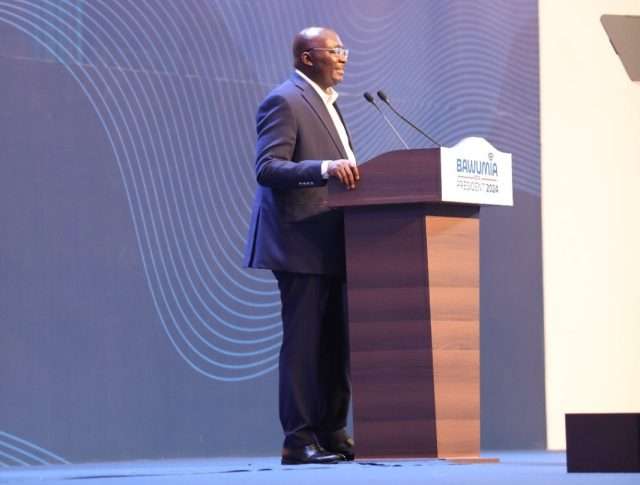Vice President Mahamudu Bawumia has promised to scrap the electronic levy (E-levy) if he is given the opportunity to become Ghana’s next president.
In his Next Chapter speech in Accra on February 7, 2024, the flagbearer of the NPP said that under his leadership, E-levy would be a relic of the past.
“I will abolish the electronic tax, popularly called, E-levy if you give me the nod to lead you as president” he stated.
He also outlined several other measures to improve revenue generation without burdening the already burdened taxpayers.
“To increase government tax revenue, we have to reform and refocus the Ghana Revenue Authority (GRA) towards broadening the tax base. Unfortunately, the pressure that is placed on GRA staff to collect revenues makes them focus on existing tax payers”, he added.
“Sometimes they even have to go to sit in peoples shops to monitor sales (a process known as invigilation). In fact, many businesses feel harassed by this process and the constant audits of their operations. This has to stop. We must strike the right balance between collecting revenue and allowing businesses to thrive. Our job is to protect the productive forces” he further stated.
He touched on the need to broaden the tax net. “Estimates suggests revenues amounting to 13% of GDP (or $24 billion in 2023) are not collected because people are outside the tax net. Even collecting half of or a quarter of this annually will be a game changer for public finances. To do this, we need to inculcate and enforce a culture of people filing their tax returns”.
To enhance a better tax administration and collection, he stated that incentives must be provided to encourage people to file their tax returns even if they will pay zero taxes.
Vice President Bawumia said that the current tax regime has been with us since independence and it has failed us. Many of the wealthy do not pay taxes (including property taxes). Too much discretion results in corruption.
“We want a regime that is easy to understand, easy to comply with and easy to enforce and that is not subject to so much discretion. Many individuals and businesses find our tax system cumbersome and confusing and many feel harassed by the GRA” he further stressed.
“My administration will introduce a very simple, citizen and business friendly flat tax regime. A flat tax of a % of income for individuals and SMEs (which constitute 98% of all businesses in Ghana) with appropriate exemption thresholds set to protect the poor. With the new tax regime, the tax return should be able to be completed in minutes! We will also simplify our complicated corporate tax system and VAT regime” he pledged.
To start the new tax system on a clean slate, he said that his government will provide a tax amnesty (i.e. a complete exemption from the payment of taxes for a specified period and the waiving of interest and penalties) up to a certain year to individuals and businesses for failures to file taxes in previous years so that everyone will start afresh.
Tax digitalization will be implemented across all aspects of tax administration. Everyone will be required to file a very simple tax return electronically through their mobile phone or computer. There will be no manual or paper filing of taxes from 2025. Faceless assessments will provide transparency and accountability. There will be no need for GRA to send officers to go sit in shops. E-invoicing, as being implemented by the GRA will be extended to all companies. Estonia, India and Mexico will provide very useful models for Ghana in the area of tax digitalization, Dr. Bawumia assured.
He also said that any audits by GRA would also be done electronically and facelessly by GRA. Furthermore, no entity would be audited more than once in five years unless anomalies are detected which the individual or company does not correct after being given the opportunity to do so.
“We will amend the law such that if there is a dispute about tax assessment, a binding arbitration will take place through a body constituted by institutions such as the Ghana Arbitration Center, Institute of Taxation, AGI, Institute of Chartered Accountants, PEF, and Ghana Employers Association with a mandate to resolve any appeal in a maximum of three months. This will not affect companies who by their agreements have such arbitrations taking place in international jurisdictions” he added.







































